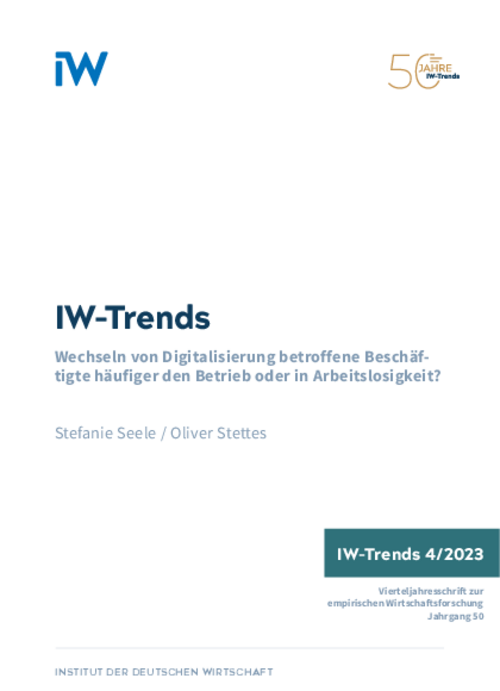Concerns that the increasing use of technology in routine occupations could lead to job losses seem to have so far proved unfounded.

Do the Employees Affected by Digitisation Change Establishments More Frequently or Do They Become Unemployed More Often?

Concerns that the increasing use of technology in routine occupations could lead to job losses seem to have so far proved unfounded.
The authors conducted an analysis of mobility processes among employees subject to social security contributions in a representative 2-per-cent-sample of process data from the German Federal Employment Agency (SIAB). The results for the years 2012 to 2021 reveal that occupational segments strongly affected by digitisation technologies showed significantly higher employment stability and measurably fewer workers entering unemployment. This was true both for those whose jobs could particularly easily be replaced by new technologies and for those employed in the digitisation process itself, where new technologies involve an especially large number of complementary activities and require the appropriate competences. Four out of five employees in the 2012 sample remained with the same employer for the following nine years. Almost 10 per cent of those in easily replaceable jobs and nearly 9 per cent of employees in the digitalising process changed establishments. Employees in both occupational segments were less likely to become unemployed than in comparison groups. This phenomenon could be explained by firms’ interest in developing company-specific capital. Workers in easily replaceable occupations may be benefiting from their employer’s investments in human capital, for example in the form of retraining in other skills the company needs. On the other hand, firms may be retaining workers in occupations directly involved in the digitalisation process by investing in organisational capital, ensuring such staff members are deployed to the maximum advantage of both sides.

Do the Employees Affected by Digitisation Change Establishments More Frequently or Do They Become Unemployed More Often?

More on the topic

Orphaned executive chairs in German companies
In 2023, half of the companies in Germany reported increasing problems in filling vacancies for management positions because employees are not aiming for a career. Larger companies are less affected than small companies.
IW
Office work in transition: Analysis of the working conditions of office workers
Office work has changed considerably over time and reflects both technical progress and the zeitgeist of the decades.
IW